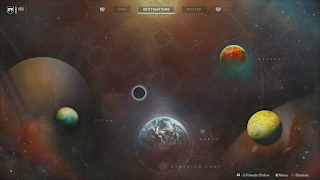Yesterday’s long-awaited Destiny 2 reveal was undeniably awesome, but for the game’s enthusiastic hardcore community it was also bittersweet. Yes, there’s a new Destiny adventure on the horizon, but that also makes the old one history. And moving forward means leaving things behind.
Bungie keeps saying that Destiny 2 will be a “fresh start” for old and new players alike. All the precious trophies we’ve earned over the last three years — the flamboyant armor, the outrageous guns, the rocket launchers and giant lasers we pined for and sought after endlessly — will be gone. And so will Destiny’s two most unique abilities, the Defender Titan’s bubble shield and the Sunsinger Warlock’s self-resurrection.
But there might be good reasons for that.
At its massive unveiling event in LA, Bungie showed off three new subclasses that will appear in Destiny 2: The Dawnblade Warlock, with a flaming sword; the Arcstrider Hunter, wielding an electric staff; and the Sentinel Titan, flinging a glowing purple Captain America shield. The Defender Titan and Sunsinger Warlock were conspicuously absent from those announcements, aside from the bubble shield popped by one non-playable character in a cutscene. And that’s because they’re not in the game, Destiny 2 World Lead Steve Cotton confirmed in an interview.
“Super” abilities in Destiny 2 are meant to be more offensive than tactical or defensive. The three new classes, as well as the Destiny 1 classes that are confirmed to be returning (Striker, Gunslinger, and Voidwalker), are focused on causing large amounts of damage as quickly as possible. “The super is for when you want to go to town,” Cotton said.Those types of tactical abilities aren’t gone — they’re just not your super anymore.
Don’t panic, though. Yes, the Defender’s bubble shield is one of Destiny’s most iconic abilities. And the Sunsinger’s self-res has caused more clutch saves than all the others combined. But those types of tactical abilities aren’t gone — they’re just not your super anymore.
Now, Warlocks, Titans, and Hunters have their own distinctive “class abilities” that augment their loadouts with more tactical powers, several of them fulfilling similar roles to the bubble shield in the first Destiny. Titans, for example, can periodically deploy front-facing shields of various sizes, while Warlocks can deploy a “rift” that powers up or heals players within a small area. These abilities have their own cooldowns, much like grenades and melee attacks. By themselves they aren’t as impactful as a Titan bubble is now, but they can be used more frequently, and Destiny 2 players will no doubt find creative ways to combine them. Titan mains will no doubt miss their bubbles, but Cotton said the changes are for the best.
It’s to create a fantasy that you really understand about your character — what Warlocks are all about, what Hunters are all about, and what Titans are all about,” he said. “Instead of just being a flat list of ‘here’s all the things that you can choose,’ [the subclass menu now has] paths for you to choose. And the goal there was to make it so you can’t make a bad choice. It’s like, you go this path, you’re going to become this fantasy; you go this path, you’re going to become that fantasy. And you always have those abilities sitting there for you to use.”
So what’s the point of supers in Destiny 2, besides “going to town”? If they’re all about causing damage, what differentiates them? Cotton laid out some of the distinctions among Titans, Warlocks, and Hunters in general, like the fact that Titans are now more focused on defense, while Hunters are all about acrobatics and dodging. But for now there doesn’t seem to be a satisfying answer to the question of what separates a flaming sword from an electric staff or a glowing Captain America shield. They’re all great for bashing aliens in the face, but whether there’s more to these abilities than that remains to be seen.Titans are now more focused on defense, while Hunters are all about acrobatics and dodging.
There are a lot more big changes in store in Destiny 2. Weapon slots have been re-jiggered so you now get two primaries and one “power” weapon, which includes shotguns, snipers, fusion rifles, rocket launchers, grenade launchers, and swords. (Cotton said heavy ammo will drop more often to compensate.)
There are new social features, including integrated clan support and a form of matchmaking Bungie is calling “guided games,” which matches solo players up with compatible clans. And Destiny 2 has the biggest and most detailed open world areas yet — Cotton said the new European Dead Zone is larger and far more dense than the current game’s Cosmodrome, even including the Plaguelands area added on in the “Rise of Iron” expansion last year. And that’s just one of four confirmed new areas.
Destiny’s journey from Bungie’s imagination to players’ screens over the last few years has been tumultuous. Change is hard — no one knows that better than those who make and play Destiny. But sometimes it can be for the best, too. We’ll find out if that’s the case this time when Destiny 2 launches on PS4 and Xbox One Sept. 8, and PC some time later.
Mike Rougeau is a freelance journalist who lives in Los Angeles with his girlfriend and two dogs.


